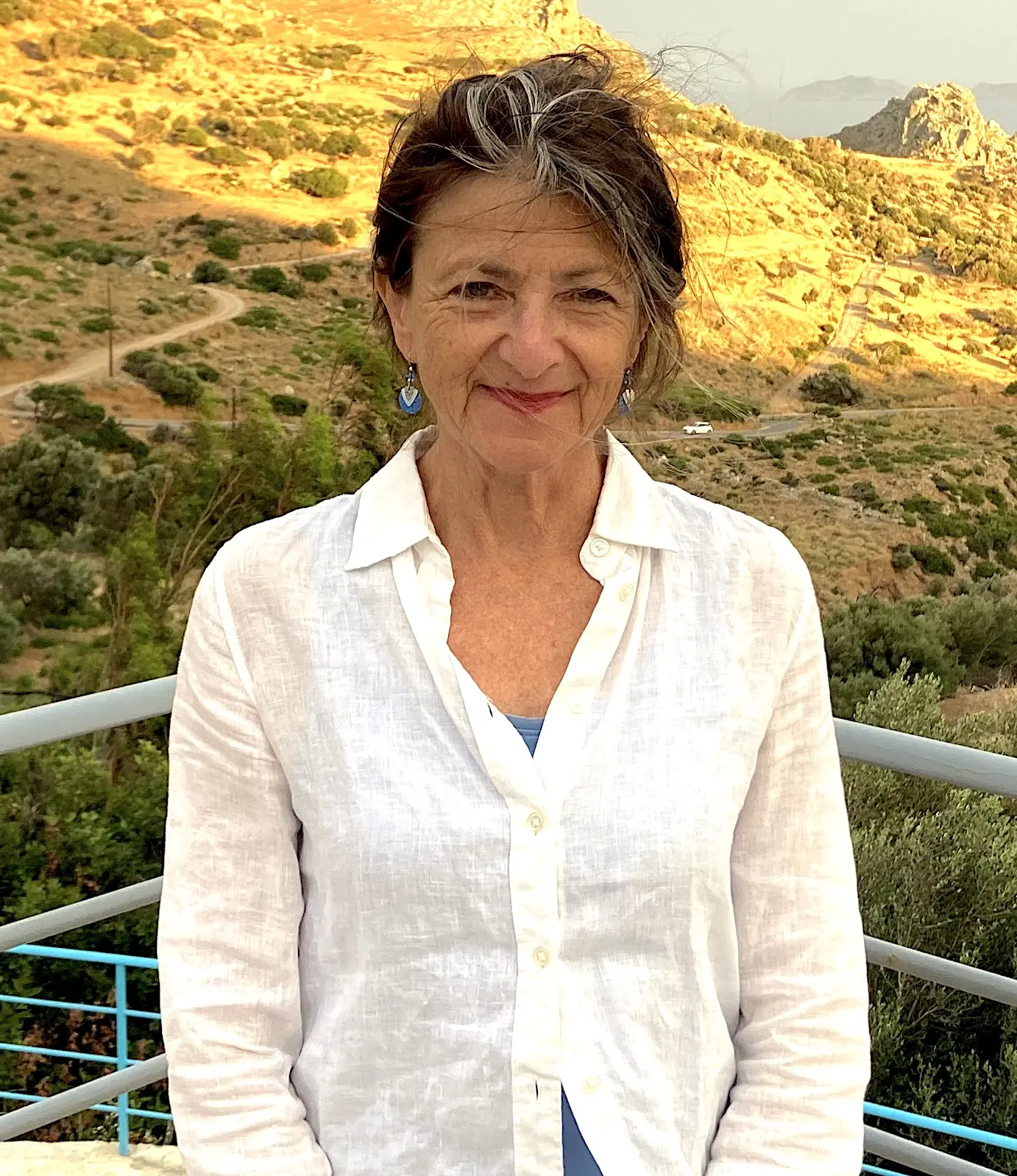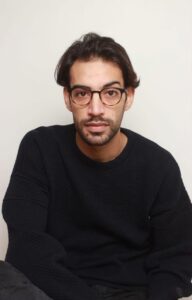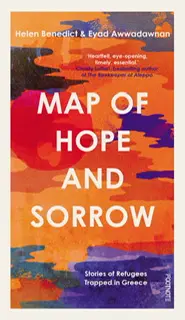The PEN Ten is PEN America’s weekly interview series. This week, PEN America’s Program Director, Literary Awards Donica Bettanin speaks with Helen Benedict and Eyad Awwadawnan, co-authors of Map of Hope and Sorrow: Stories of Refugees Trapped in Greece (Footnote Press, 2022). Amazon, Bookshop.

1. Map of Hope and Sorrow shares the stories of five refugees’ difficult journeys from the Middle East and Africa to Greece with remarkable intimacy and humanity. What was the original inspiration for the book?
Helen: In a way, the United States’ unjustified invasion of Iraq in 2003 was the original inspiration for this book. That’s when I started writing about American soldiers and Iraqi refugees in my novels Sand Queen and Wolf Season. Then Trump issued his horrifying ban against Muslims in 2017, an act so bitterly unjust that I had to turn to the subject again. But the specific inspiration for Map of Hope and Sorrow began in 2018, when I first went to see the refugee camp on the Greek island of Samos, met Eyad, a gifted interviewer and man of great compassion, and we started listening together to people’s stories of incredible suffering and courage. Those stories are what truly inspired us both to write Map of Hope and Sorrow.
 Eyad: Looking out at all the small ripped-up tents in a hilly forest around me, at an unkempt child gazing out at the beautiful Aegean Sea from behind barbed wire, a pregnant woman lying on the ground in front of a camp clinic . . . just seeing that reality every day, for months on end, was enough to create the spark of inspiration inside me. If living through the Syrian Civil War has taught me anything, it is that good things happen to bad people and bad things happen to good people. And this is the case in Europe, too. But seeing it happen in such a systemic way, so overtly and so consistently, without anyone being held responsible, was like fuel to the fire. It felt urgent to tell anyone who would listen what people were going through.
Eyad: Looking out at all the small ripped-up tents in a hilly forest around me, at an unkempt child gazing out at the beautiful Aegean Sea from behind barbed wire, a pregnant woman lying on the ground in front of a camp clinic . . . just seeing that reality every day, for months on end, was enough to create the spark of inspiration inside me. If living through the Syrian Civil War has taught me anything, it is that good things happen to bad people and bad things happen to good people. And this is the case in Europe, too. But seeing it happen in such a systemic way, so overtly and so consistently, without anyone being held responsible, was like fuel to the fire. It felt urgent to tell anyone who would listen what people were going through.
The other part of my inspiration was Helen herself. I could feel the strength of her commitment to telling the world the stories of the voiceless, and I witnessed the people’s desire to share their experiences, as well as their trust in her to pass those stories on. Despite the hoarseness of their tired throats, their tears, the harsh realities they told us about, Helen still wanted to listen, and vowed to let the world hear their voices, even if only through simple letters, black on white. Her passion and belief in the importance of the project was all I needed to see to get involved.
2. Time is a powerful presence in this book, the reader witnesses both great urgency and interminable waiting. How long did you spend working on the book, and did the timeline deviate from your original expectations or plans?
Helen: When I first went to Samos, I was researching a novel, The Good Deed, which is coming out in 2024, although the horrific conditions in the camp compelled me to write several articles about it. In 2020, I was about to return to Greece to meet up with Eyad and do more interviews when Covid hit, trapping me and everyone else in place. So, Map of Hope and Sorrow really came out of the pandemic, giving me the idea of asking Eyad, who was still living in Greece, to not only be my translator but my co-author. We actually got the book done faster than we expected because Footnote Press, our publisher, wanted it out in time for Refugee Week, 2022, which happened to be in the wake of the Taliban takeover of Afghanistan and Putin’s attack on Ukraine.
“I would say that perfect harmony is what characterizes the nature of our work together, just as our friendship is harmonious, too, despite how different we are in so many ways. When it comes to being co-authors, it was important for both of us to always be honest but constructive in our criticism of each other’s work.”
3. Please tell us a little about your co-authorship process.
Helen: Four years ago, Eyad and I met in a Samos stationary store, I invited him for coffee and we met up the next day. At the time, he was living in the camp there with his family, having escaped from the war in Syria, and soon he was introducing me to people who wanted to tell their stories and translating from their Arabic to my English, and I could see right away that he’s the sort of person people trust and open up to, even women. He also gave me the essay he had written about his flight that is now the Preface to our book. He wanted to be a writer, I wanted to understand what it was like to live through a war and then in a refugee camp, so we taught each other, as we still do. Once we decided to write the book together, Eyad interviewed people who spoke Arabic in Greece, while I interviewed English and French speakers over WhatsApp until I could return and meet them in person. We would then read and edit each other’s sections, while having long and wonderful conversations about their stories, the challenges and joys of translation, about Arabic and English, and about the differences and similarities between our homes and backgrounds. In short, we found working together profound, moving and also great fun.
Eyad: As Helen mentioned earlier, the first encounter was just a nice coincidence. After that, she read my article and sent it to Slate magazine, so I can say that she deserves the credit for helping my words see the light. Today, it always makes me smile when I remember what she told me once on Samos—that maybe one day we would work together on a project. That ended up coming true! I would say that perfect harmony is what characterizes the nature of our work together, just as our friendship is harmonious, too, despite how different we are in so many ways. When it comes to being co-authors, it was important for both of us to always be honest but constructive in our criticism of each other’s work. We both placed a lot of importance on staying completely true to the voices of the subjects in the book, and on building trusting and respectful relationships with them. In terms of writing, we agree on most things, I think, so working with Helen was a pleasure for me. At the same time, I have also been lucky to learn a lot from her, as she is someone who has written for many years and has extensive experience with interviewing, editing, publishing, and so on.
4. Helen, you received a PEN/Jean Stein Grant for Literary Oral History for this project. Can you take us inside the choice to present these five stories out of many?
Choosing who to keep in the book and who to leave out was not easy. We had so many stories and felt so close to the people we had been interviewing because we had talked to them for many months—in some cases, for years. But the book was growing too long, so in the end we chose a balance of women and men with very different stories and backgrounds: Hasan, a young man who fought against Assad and was captured by ISIS; Asmahan, a woman in her forties who had fled Syria to save the life of her unborn child; Evans, who barely escaped with his life from the homophobic laws and culture in Nigeria; Mursal, a young woman who fled from the Taliban just before they took over Afghanistan; and Calvin, a political refugee from Cameroon. (Helen wrote a separate chapter on the plight of women in refugee camps). We also wanted to get out of the way so that our subjects could tell their stories in their own words and talk about their entire lives, not only their experiences as refugees, so we had to limit the number of people to give them room to do their stories justice.
5. Eyad, have you always written, or were you drawn to the practice of writing as a result of your experiences?
I have loved to write ever since I was a child. I’ve always written poems—for myself, my homeland and for friends trying to win over their beloved’s hearts—and I also wrote short stories. Living through the experiences that I’ve lived through, though, and the pain that came with them, as well as the pain that I’ve witnessed on the faces of the people I know and people I’ve met, has definitely motivated me even more to use my pen. With naked words, I’m able to tell the world our stories.
“We hope our book moves all readers to be more open-minded, compassionate and active in helping refugees from all nations, religions and cultures, whether by volunteering, donating or voting, or all three. Our last chapter lists the ways every one of us can help.“
6. What was the first book or piece of writing that had a profound impact on you? Do you still feel its influence?

Eyad: For Bread Alone, by Moroccan writer Mohamed Choukri, is probably the piece of writing that has influenced me the most, because Choukri dared and allowed himself to share with the reader the misery and poverty in which he grew up, and the tragedies of colonialism and its remnants. The people readers will meet in Map of Hope and Sorrow, including me, have experienced many similar struggles, so we understand and appreciate Choukri’s courage in telling stories so full of pain, but also hope. I always hoped to be able to tell stories with the same honesty and fearlessness, which of course has never been possible in my home country Syria.
Helen: When I was a girl growing up in 1960s England, I would say that Charlotte Bronte’s Jane Eyre had the most profound effect on me, as old-fashioned as that may sound. I read it when I was about eleven, and the injustice with which Jane was treated by her stepmother and teachers burned me up. I was going to an oppressive Victorian-style school myself, so the book felt very real. I was also influenced by living for a few years in poverty-stricken British colonies in the Indian Ocean when I was small, but in terms of books, I credit Jane Eyre for awakening my passion about injustice, my feminism and my love of literature.
7. We believe that stories have the power to change hearts and minds. Who—this could be a specific person or a group of people—do you most hope will read this book?
Of course, we would love anti-immigrant, Islamophobic, and racist politicians and voters to be changed forever by our book! But that is not realistic. However, all of us are constantly barraged with anti-refugee messages today, no matter who we are, some levied intentionally by far-right politicians; some unintentionally by sloppy use of language, such as calling refugees “migrants.” (A migrant leaves her country for economic reasons, a refugee leaves to save her life.) We are told that refugees only come to make money, that they take our jobs, commit crimes and terrorism, drain our social security network, burden our economy, overwhelm us as they flood over our borders (in fact, only one in every 300 people in the world is a refugee), change our cultures, and disrespect our way of life and values—the same arguments that were used against Jews during and after World War Two. None of these beliefs is true, but if we never meet or know refugees, it is easy to stay imprisoned in our prejudices. We hope our book moves all readers to be more open-minded, compassionate and active in helping refugees from all nations, religions and cultures, whether by volunteering, donating or voting, or all three. Our last chapter lists the ways every one of us can help.
8. Is there anything that has surprised you about the reception of the book so far?
One surprise was how useful our book turned out to be in Iceland, where Eyad and his family now live. In May, just before we were scheduled to do some book events together, the right-wing branch of the government announced a plan to round up 300 refugees and deport them back to Greece. Because our book describes clearly how cruel Greece is to refugees, the opposition were able to use it in parliament to bolster their case. The happy outcome was that the plan was flouted and the refugees safe. This happened because of the work of brilliant activists, not us, but we never imagined that Map of Hope and Sorrow could be so practically useful so soon.
“Perhaps the easiest and yet one of the most valuable things we can all do is to be kind to newcomers in our land—offer them a seat on a bus, a smile, a chat, or a place to stay for a night.”
9. Map of Hope and Sorrow includes an epilogue describing what needs to be done next to help refugees in the EU. What can someone reading this today do to help?
As we say in the book, any one of us can help refugees, in the United States as well as Europe, or anywhere else, for that matter. We can vote for politicians who do not villainize or weaponize human beings, and who promote policies that aid rather than punish asylum seekers and refugees. We can donate, volunteer, demonstrate and protest against hateful rhetoric. We can befriend refugees, invite them into our homes, share tea and meals and walks. When we hear our friends repeat misinformation that demonizes refugees, we can push back with facts. Look at how the world has been treating Ukrainian refugees. We should do the same for refugees from other countries, too.
But perhaps the easiest and yet one of the most valuable things we can all do is to be kind to newcomers in our land—offer them a seat on a bus, a smile, a chat, or a place to stay for a night. It can make a huge difference. Feeling welcome is the most essential part of being able to make a new home.
10. In difficult times, so many people turn to stories for hope. Hope is also a recurring motif in your book. What gives you the greatest hope at this moment?
We live in a time when hatred of “the other” is everywhere, whipped up by the intolerant and often white-supremacist rhetoric of far-right politicians all over the world, and helped by the misinformation spread on social media platforms. Yet most people do not agree with this hateful rhetoric. We take courage from the fact that many a survey has found that most people in the world believe in the moral obligation to help those who are fleeing war and catastrophe, and in the right of human beings to live in safety, freedom and dignity. In the US, 60 percent of Americans believe the US has a moral obligation to help refugees.
We and all the people in our book want to defy this hatred and prejudice by telling stories about what we humans have in common, not how different we are. We all need food, dignity, safety, love and a sense of belonging, for example, and it is in these commonalities that we find compassion and kindness. As Mursal, the young Afghan in our book, says: “We were not born refugees. We had homes and jobs. But because of the problems in our country, we had to leave. I am sure if you were us, you would do what we did.”
Eyad Awwadawnan, formerly a law student from Damascus, Syria, is a writer and poet currently living and working in Reykjavik, Iceland. During his four years in Greece, he worked as a cultural mediator, translator and interpreter for various NGOs. He published a featured article in Slate Magazine detailing his escape from Syria.
Helen Benedict, who has been writing about refugees for over ten years, is a recipient of the 2021 PEN/Jean Stein Grant for Literary Oral History and the Ida B. Wells Award for Bravery in Journalism. She is the author of seven novels and six books of nonfiction, including the award-winning The Lonely Soldier: The Private War of Women at War Serving in Iraq, and the novel, Wolf Season. Her writing inspired both a class action suit against the Pentagon on behalf of people sexually assaulted in the military and the 2012 Oscar-nominated documentary, The Invisible War. She is a Professor of Journalism at Columbia University, New York.


